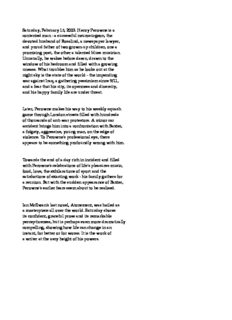Table Of ContentSaturday, February 15, 2003. Henry Perowne is a
contented man - a successful neurosurgeon, the
devoted husband of Rosalind, a newspaper lawyer,
and proud father of two grown-up children, one a
promising poet, the other a talented blues musician.
Unusually, he wakes before dawn, drawn to the
window of his bedroom and filled with a growing
unease. What troubles him as he looks out at the
night sky is the state of the world - the impending
war against Iraq, a gathering pessimism since 9/11,
and a fear that his city, its openness and diversity,
and his happy family life are under threat.
Later, Perowne makes his way to his weekly squash
game through London streets filled with hundreds
of thousands of anti-war protestors. A minor car
accident brings him into a confrontation with Baxter,
a fidgety, aggressive, young man, on the edge of
violence. To Perowne's professional eye, there
appears to be something profoundly wrong with him.
Towards the end of a day rich in incident and filled
with Perowne's celebrations of life's pleasures music,
food, love, the exhilarations of sport and the
satisfactions of exacting work - his family gathers for
a reunion. But with the sudden appearance of Baxter,
Perowne's earlier fears seem about to be realised.
Ian McEwan's last novel, Atonement, was hailed as
a masterpiece all over the world. Saturday shares
its confident, graceful prose and its remarkable
perceptiveness, but is perhaps even more dramatically
compelling, showing how life can change in an
instant, for better or for worse. It is the work of
a writer at the very height of his powers.
Ian McEwan has written two collections of stories, First Love, Last Rites and In Between the
Sheets, and
nine novels, The Cement Garden, The Comfort of
Strangers, The Child in Time, The Innocent, Black
Dogs, The Daydreamer, Enduring Love, Amsterdam, and Atonement. He won the Booker Prize
for Amsterdam in 1998.
www.ianmcewan.com
Jonathan Cape
Random House
Saturday
By the same author
FIRST LOVE, LAST RITES
IN BETWEEN THE SHEETS
THE CEMENT GARDEN
THE COMFORT OF STRANGERS
THE CHILD IN TIME
THE INNOCENT
BLACK DOGS
THE DAYDREAMER
ENDURING LOVE
AMSTERDAM
ATONEMENT
THE IMITATION GAME
(plays for television)
OR SHALL WE DIE?
(Libretto for oratorio by Michael Berkeley)
THE PLOUGHMAN'S LUNCH
(film script)
SOUR SWEET
(film script)
Saturday
Ian McEwan
JONATHAN CAPE
LONDON
Published by Jonathan Cape 2005
2468 10 975 31
Copyright © Ian McEwan 2005
Ian McEwan has asserted his right under the Copyright, Designs
and Patents Act 1988 to be identified as the author of this work
Grateful acknowledgement is made to Faber & Faber for permission to reprint
an extract from 'Water' by Philip Larkin from The Wliitsun Wi'diHn;™
This book is sold subject to the condition that it shall not,
by way of trade or otherwise, be lent, resold, hired out,
or otherwise circulated without the publisher's prior
consent in any form of binding or cover other than that
in which it is published and without a similar condition
including this condition being imposed on the
subsequent purchaser
First published in Great Britain in 2005 by
Jonathan Cape
Random House, 20 Vauxhall Bridge Road,
London SVV1V 2SA
Random House Australia (Pty) Limited
20 Alfred Street, Milsons Point, Sydney,
New South Wales 2061, Australia
Random House New Zealand Limited
18 Poland Road, Glenfield,
Auckland 10, New Zealand
Random House South Africa (Pty) Limited
Endulini, 5A Jubilee Road, Parktown 2193, South Africa
The Random House Group Limited Reg. No. 954009
www.randomhouse.co.uk
A CIP catalogue record for this book is available from the British Library
ISBN 0-224-07299-4 (Cased Edition)
ISBN 0-224-07675-2 (Trade Paperback)
ISBN 0-224 07687-6 (Limited Edition)
Random House Group are natural, recyclable
"± '"" !10?I n*™" '" --"le Crests; the manufacH
processes conform to the
Papers used by The environmental regulations of the country of origin
manufacturing
prod
Typeset by Palimpsest Book Production Limited
Polmont, Stirlingshire
Printed and bound in Great Britain by
Clays Ltd, St Ives pic
To Will and Greg McEwan
For instance? Well, for instance, what it means to be a
man. In a city. In a century. In transition. In a mass.
Transformed by science. Under organised power. Subject
to tremendous controls. In a condition caused by mechanization.
After the late failure of radical hope-,. In a
society that was no community and devalued the person.
Owing to the multiplied power of numbers which made
?V v.-lf nodi.dbk'. Which srenf rnllirnrv billions .i^imv.!
foreign enemies but would not nay for order at home.
Which permitted savagery and barbarism in its own
great cities. At the same time, the pressure of human
millions who have discovered what concerted efforts
and thoughts can do. As megatons of water shape organisms
on the ocean floor. As tides polish stones. As winds
hollow cliffs. The beautiful supermachinery opening a
new life for innumerable mankind. Would you deny
them the right to exist? Would you ask them to labor
and go hungry while you yourself enjoyed old-fashioned
Values? You - you yourself are a child of this mass and
a brother to all the rest. Or else an ingrate, dilettante,
idiot. There, Herzog, thought Herzog, since you ask for
the instance, is the way it runs.
Saul Bellow, Herzog, 1964
One
Description:If you're expecting this book to develop into a story, forget it. At many points in the book (pg 30,50 90 150 200 etc.) I thought something would happen to peak my interest. It remains boring, highly unbelievable and has an absurd "twist" in the very late chapters. As a surgeon, I was little impress

